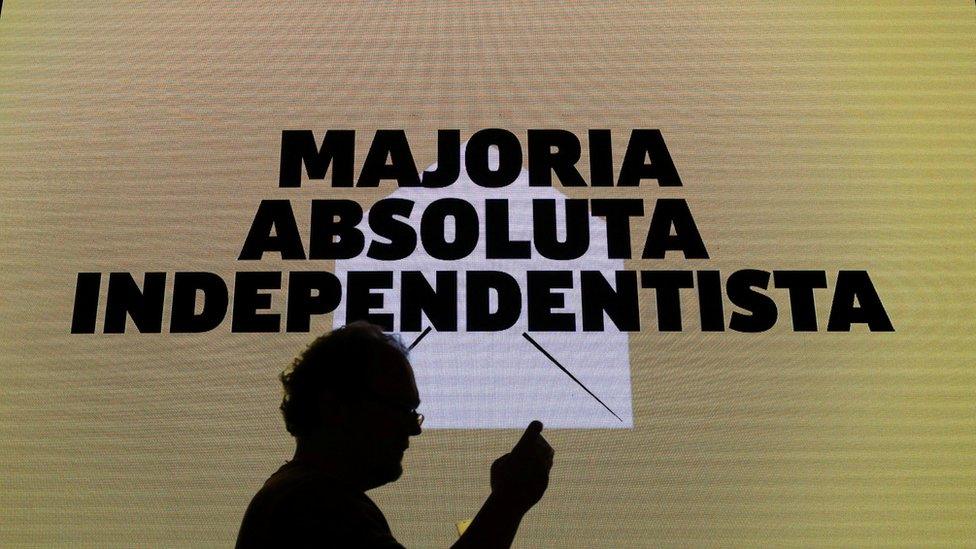Spain Catalonia: Clashes after separatist leaders detained
- Published
Police clashed with protesters in Barcelona
Crowds of protesters in Spain's Catalonia region have clashed with police after the Supreme Court stepped up legal action against separatists.
Spain's Supreme Court ruled 25 Catalan leaders should be tried for rebellion, embezzlement or disobeying the state.
Convictions could result in up to 30 years in prison.
More than 20 people were injured as police used riot batons to keep protesters away from federal buildings in Barcelona on Friday night.
Demonstrations also took place in other parts of Catalonia.
In Madrid, a Supreme Court judge ordered five more Catalan leaders to be detained without bail, pending trial over their involvement in October's banned independence referendum.
One of those taken into custody was Jordi Turull who was to be the subject of a vote in the Catalan parliament on Saturday for regional president.
Other separatist figures were already in custody or had gone into exile abroad.
What happened in the protests?
Friday night's rallies had been organised by a separatist group before the court decisions were announced.
But the rulings appeared to inflame the protesters and angry crowds confronted lines of riot police protecting Spanish government buildings in Barcelona.
They waved flags and chanted independence slogans while some burned pictures of the Supreme Court judge and of Spain's King Felipe.
Tensions spilled over into violence as some protesters tried to break through police lines.
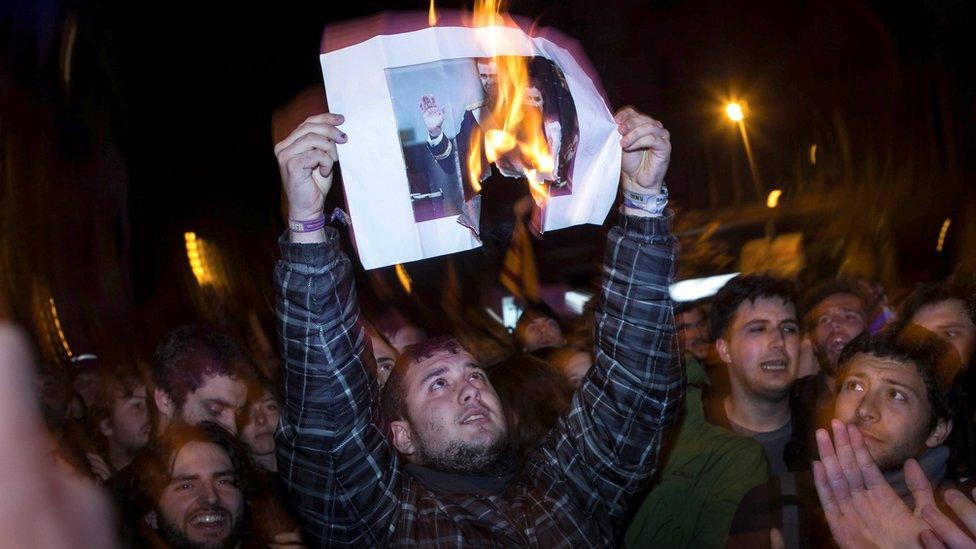
Some protesters in Barcelona burned pictured of King Felipe
A calmer rally took place in Catalonia Square, in the city centre.
One protester there, Carme Sala, said: "There are two million people who want to leave Spain and they can't put us all in prison."
Catalan TV showed rallies in support of the jailed leaders elsewhere in the region including in the cities of Vic and Tarragona.
What angered the protesters?
Friday's rulings at the Supreme Court in Madrid were considered the most serious challenge to date for the Catalan independence movement. Almost the entire leadership now faces a major legal fight.
Allow X content?
This article contains content provided by X. We ask for your permission before anything is loaded, as they may be using cookies and other technologies. You may want to read X’s cookie policy, external and privacy policy, external before accepting. To view this content choose ‘accept and continue’.
Altogether 25 separatists have been charged variously with sedition, rebellion, embezzlement and other crimes. They deny the allegations.
The five Catalan politicians remanded in custody on Friday were:
Jordi Turull - former Catalan government spokesman and the latest candidate for regional president
Josep Rull - former Catalan development minister
Carme Forcadell - former Catalan parliament speaker
Raul Romeva - former Catalan foreign affairs chief
Dolors Bassa - former Catalan labour minister
All five spent some time in detention following the banned referendum but were released on bail late last year pending investigations into their individual roles in the banned referendum.
In his 70-page ruling, Supreme Court Judge Pablo Llarena said that they should be returned to jail as they represented a flight risk. He did not set a date for their trial.
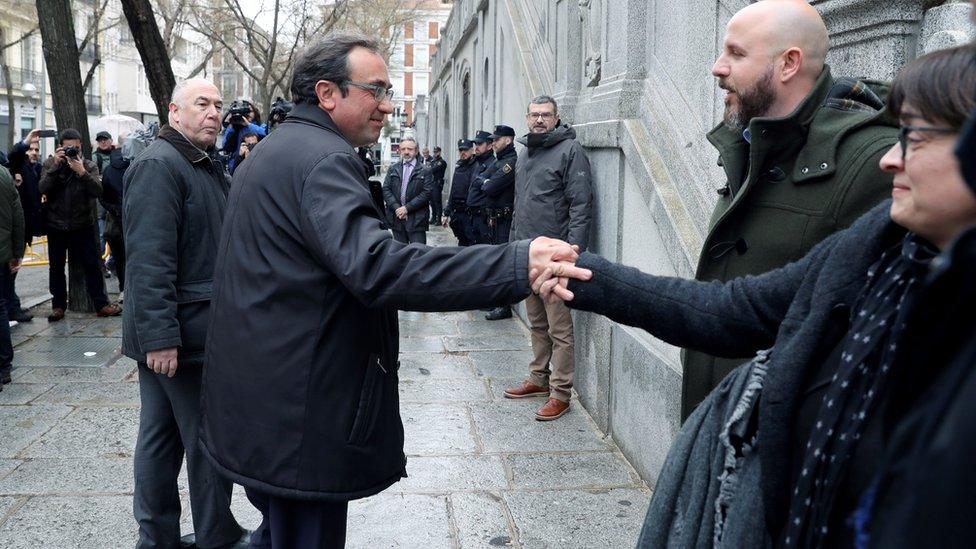
Politician Josep Rull said goodbye to family and friends before entering court on Friday
The five join four other Catalan leaders already detained in prison. They include Oriol Junqueras, the former Catalan vice-president, and Jordi Sánchez, who was nominated to lead the Catalan government but dropped the bid after the Spanish authorities refused to release him to attend an investiture ceremony.
Judge Llarena also issued an arrest warrant for Marta Rovira, the deputy head of the separatist Esquerra Republicana party, who failed to appear in court on Friday.
It later emerged that she had fled into exile and Spanish media reported that she was in Switzerland.
Allow X content?
This article contains content provided by X. We ask for your permission before anything is loaded, as they may be using cookies and other technologies. You may want to read X’s cookie policy, external and privacy policy, external before accepting. To view this content choose ‘accept and continue’.
"Exile will be a difficult road, but it is the only way I have to recover my political voice. Long live a Catalan Republic for all!," she said in a letter published in the Spanish media.
Judge Llarena also reactivated European arrests warrants for six others who are in self-imposed exile, including former Catalan President Carles Puigdemont who is in Belgium.
What other reaction has there been?
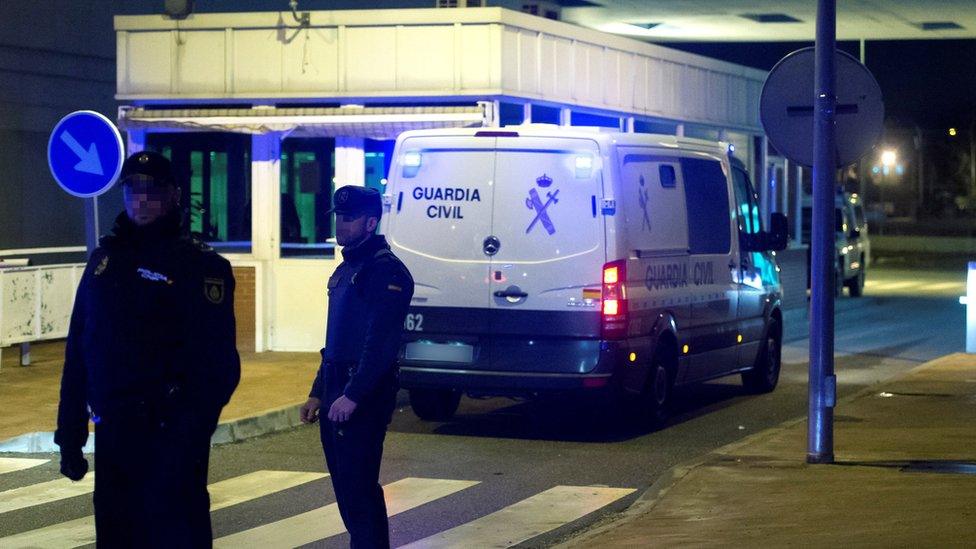
The five Catalan leaders were driven from the court to prison
The nationalist Catalan European Democratic Party (PDeCAT) condemned the court ruling and demanded the release of all those held in prison.
Although the leadership vote for Mr Turull can no longer take place on Saturday, Catalan parliament speaker Roger Torrent said he would use the parliamentary session to read a statement in support of those in prison.
Following the referendum, the central government in Madrid sacked the Catalan regional government, imposed direct rule and called new elections but pro-independence parties returned with a slim majority.
In a setback for the pro-independence cause, a survey published by the respected Catalan Centre for Opinion Studies recently suggested support for independence had dropped sharply, with a majority of Catalans now against the idea.
- Published21 March 2018
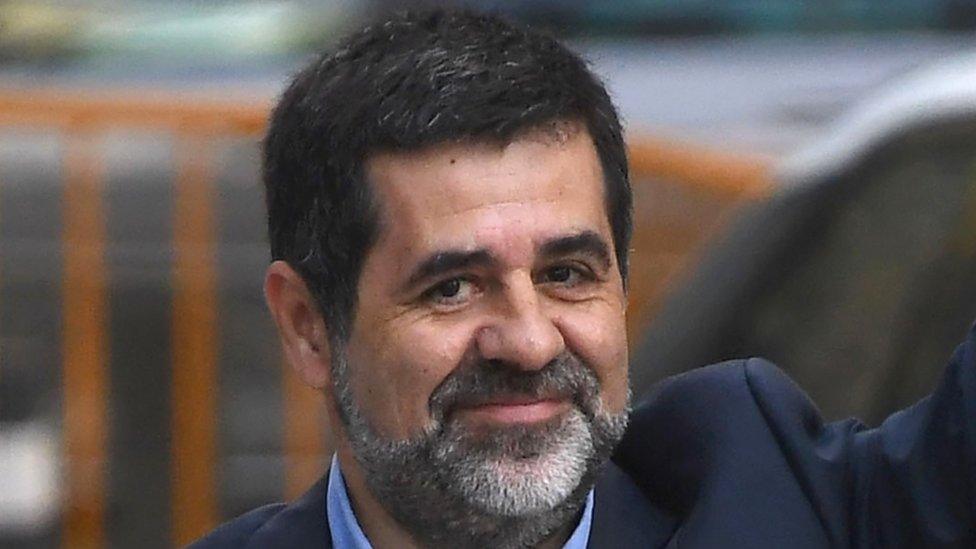
- Published1 March 2018
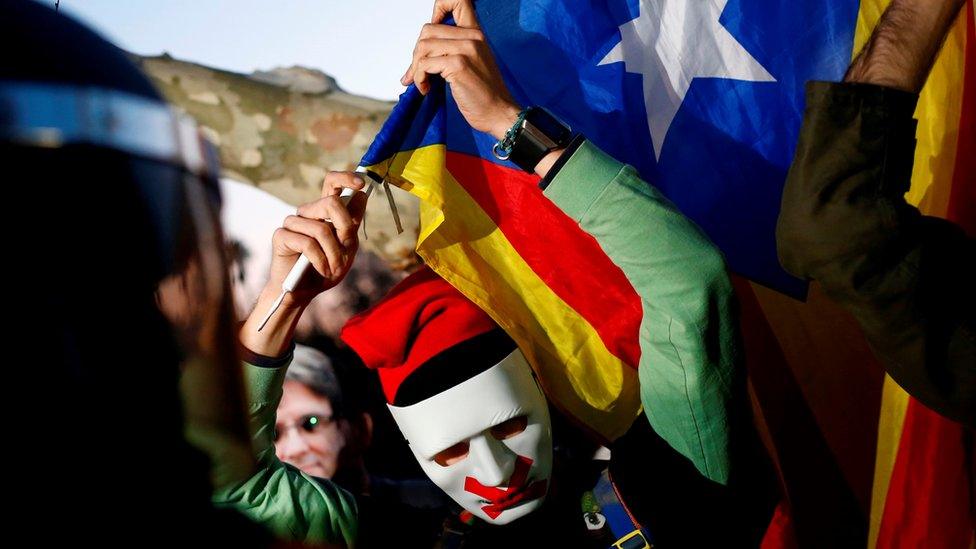
- Published20 February 2018
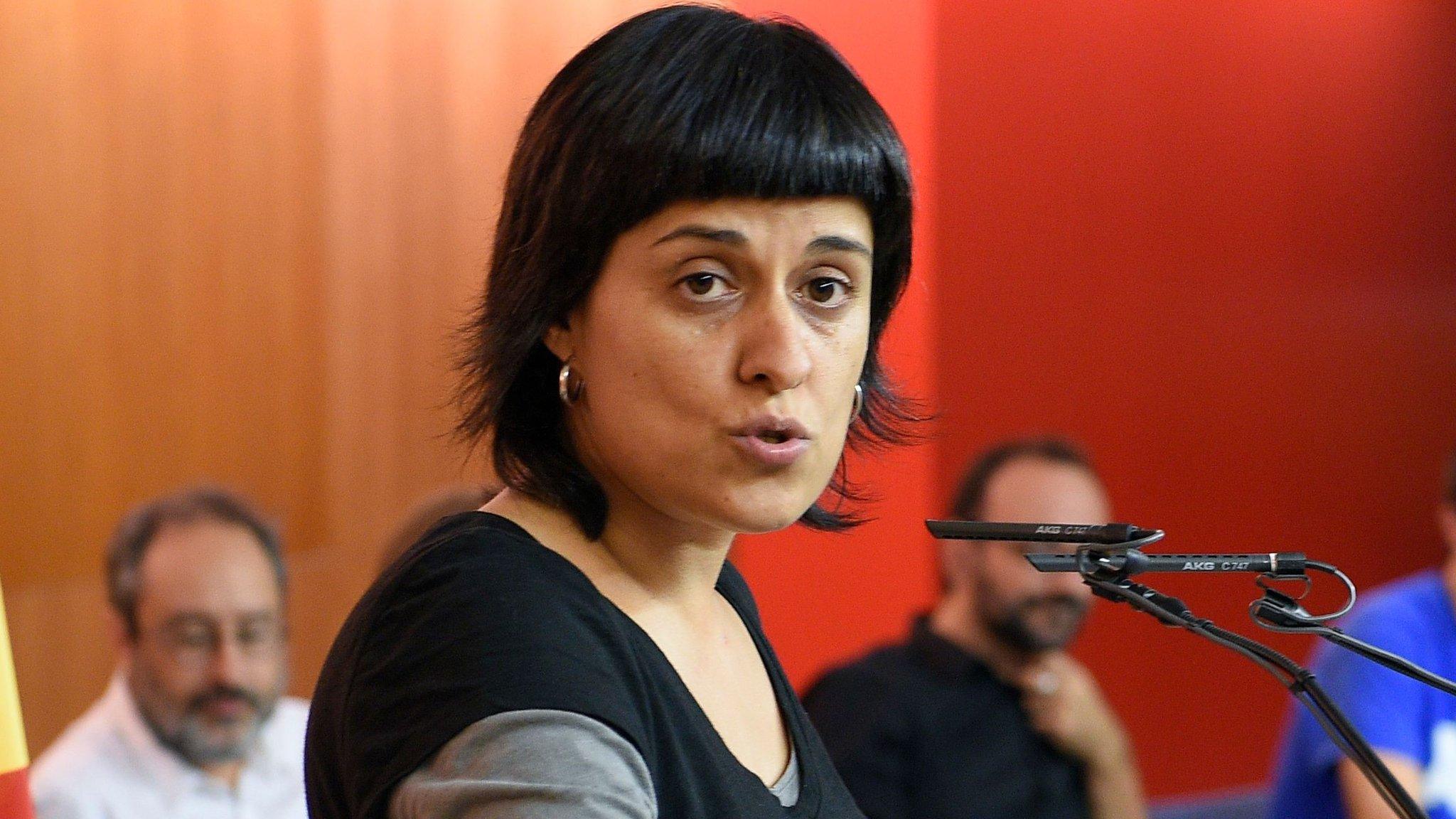
- Published26 March 2018
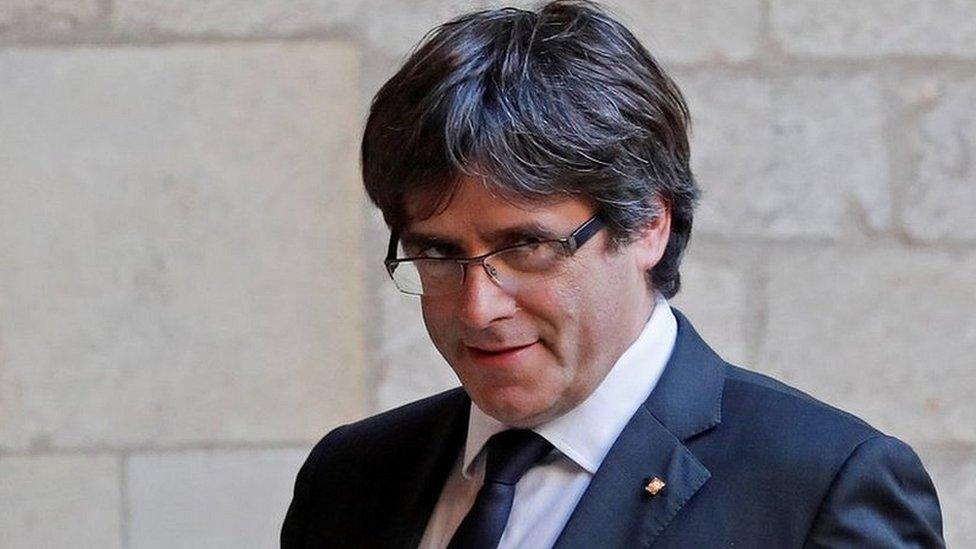
- Published18 October 2019
